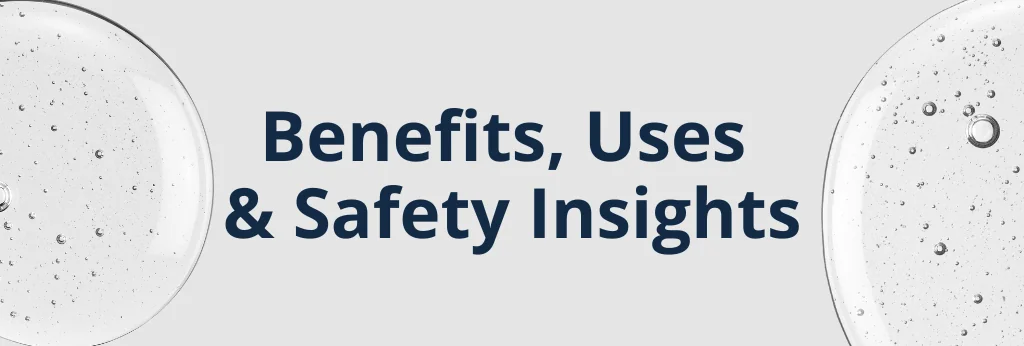Polysorbate 20 is a clear to pale-yellow viscous liquid known for binding oil and water together. As a stable and non-toxic surfactant and emulsifier, polysorbate 20 is a common ingredient used across various industries. Explore this guide to learn all about polysorbate 20.
- What is polysorbate 20?
- Benefits of polysorbate 20
- Polysorbate 20 applications
- Polysorbate 20 safety and regulations
What Is Polysorbate 20?
History
Polysorbate 20 is a non-ionic surfactant and emulsifier developed in the 1950s. It belongs to a surfactant class designed to enhance various compounds’ stability and solubility. The development of polysorbate 20 involved the ethoxylation of sorbitan laurate, a sorbitan ester, with ethylene oxide. This process created a compound that proved highly effective in stabilizing oil-based formulations.
Initially, polysorbate 20 found significant applications in the pharmaceutical industry due to its ability to stabilize oil-based drug formulations. Its effectiveness in ensuring uniform dispersion and solubility of active ingredients contributed to its widespread adoption. Over time, the versatility of polysorbate 20 became apparent, leading to its expanded use in the cosmetics and food industries, where it continues to be valued for its stabilizing and emulsifying properties.
Chemical Structure & Properties
Polysorbate 20 is derived from sorbitan, a sugar alcohol, and fatty acids. Its chemical structure features a hydrophilic polyethylene glycol (PEG) chain attached to a hydrophobic sorbitan ester backbone.
This non-ionic structure is essential for creating stable emulsions without negatively interacting with other ingredients. The “20” in its name refers to the specific type of fatty acid used in its formulation. In this case, lauric acid.
Polysorbate 20 is renowned for its low toxicity and effectiveness in maintaining formulation consistency. Its ability to stabilize and blend various components makes it a staple ingredient in pharmaceuticals, cosmetics, and food products, where its role is critical in ensuring product stability and performance.
Characteristics of Polysorbate 20
Emulsifying Properties
Polysorbate 20 is a emulsifier, which helps water and oil combine into stable formulations. The hydrophilic PEG chain interacts with the water phase, while the hydrophobic sorbitan ester backbone interacts with the oil phase.
This dual interaction allows Polysorbate 20 to surround oil droplets in a water-based environment, forming micelles that stabilize the dispersion and prevent phase separation. As a result, final products remain homogeneous and consistent, improving a formulation’s visual appeal and performance.
Solubilizing Capabilities
In addition to its emulsifying abilities, Polysorbate 20 works as a solubilizer, helping hydrophobic substances disperse in water-based solutions. To do this, Polysorbate 20 encapsulates molecules – such as fragrances, essential oils, and other active ingredients typically insoluble in water – so they can uniformly distribute throughout the formula without compromising its integrity or causing unwanted precipitation.
This property is especially valuable in formulations where consistent performance and sensory appeal matter, such as perfumes, personal care products and pharmaceuticals. Polysorbate 20 helps maintain the desired characteristics of the product, ensuring a pleasant user experience.
Mild & Non-Irritating
Polysorbate 20 is mild and non-irritating, making it an excellent choice for sensitive skin formulations. Unlike surfactants that disrupt the skin’s natural barrier and cause irritation, Polysorbate 20 is explicitly designed to be gentle.
Its non-ionic properties prevent harsh interactions with skin cells, making it suitable for use in personal care and pharmaceutical products targeting reactive skin types. Additionally, its ability to solubilize active ingredients without affecting the skin’s barrier function enhances its appeal in skin care products, contributing to safer and more comfortable use.
Stabilizing Properties
Polysorbate 20 enhances the stability of formulations by preventing ingredient separation and maintaining consistent product characteristics over time. It stabilizes emulsions, ensuring that the product remains practical and aesthetically pleasing despite changes in temperature or storage conditions. This stability is crucial for both consumer satisfaction and the product’s efficacy.
These stabilizing properties of Polysorbate 20 ensure that the product performs as expected throughout its shelf life.
Versatility Across Industries
The versatility of polysorbate 20 spans several industries, including pharmaceuticals, cosmetics, food, animal care, and industrial applications. Its multifunctional properties—emulsifying, solubilizing, and stabilizing—make it valuable in creating high-quality products tailored to diverse consumer needs
Polysorbate 20 Applications
Personal Care and Cosmetics
Formulation Stability: Polysorbate 20 plays a vital role in maintaining the stability of cosmetic formulations. Its ability to evenly disperse pigments and other solid ingredients in liquids ensures consistent color and texture throughout the product. It can also adjust the viscosity and flow of cosmetic coatings, ensuring the product performs as intended.
Polysorbate 20 extends the shelf life of cosmetic products by improving stability and reducing the risk of ingredient separation.
Gentle on Skin: The non-ionic nature of Polysorbate 20 makes it suitable for sensitive skin formulations. Unlike ionic surfactants that disrupt the skin’s barrier and cause irritation, Polysorbate 20’s mildness makes it less likely to sensitize the skin.
Its gentle properties and effectiveness in solubilizing and dispersing other ingredients make it ideal for skincare products designed for delicate or reactive skin types. This ensures that the formulations are both practical and comfortable for daily use.
Animal Pharmaceuticals
Drug Formulation Stability: Polysorbate 20’s unique chemical properties contribute to the stability of animal drug formulations. Its non-ionic nature and the PEG chain allow it to create stable emulsions by reducing the interfacial tension between oil and water phases. This ensures uniform dispersion throughout a formulation.
By improving the solubility of poorly water-soluble drugs, Polysorbate 20 helps maintain their stability in solution, preventing precipitation and ensuring consistent dosing.
Emulsification of Medications: Polysorbate 20 acts as an effective emulsifier in pharmaceutical suspensions and emulsions, forming micelles around oil droplets. This process involves the hydrophilic PEG chain interacting with the aqueous phase, while the hydrophobic sorbitan ester backbone interacts with the oil phase.
Dual interaction allows Polysorbate 20 to stabilize the oil-water interface, preventing phase separation and enhancing the delivery and bioavailability of medications. This interaction mainly benefits oral and injectable formulations, where consistent drug delivery is critical.
Animal Care
Topical Formulations: In veterinary medicine and animal care, Polysorbate 20 is utilized in topical treatments to ensure the even distribution of ingredients on the skin. Like pharmaceutical applications, its emulsifying properties facilitate mixing oil and water in topical ointments and creams to ensure the uniform application of active ingredients.
Safety in Animal Products: Polysorbate 20’s mild and non-toxic nature makes it an excellent choice for animal grooming and care products. Its gentle properties ensure that it does not cause adverse reactions or discomfort when used in products for pets and livestock.
Polysorbate 20 Safety and Regulations
Polysorbate 20 is considered safe for pharmaceuticals, personal care products, and animal care products. It is non-toxic, non-irritating, and well-tolerated by most individuals. However, it’s important to incorporate it in your product within recommended concentrations according to your ingredient distributor. While rare, some individuals may experience mild irritation or allergic reactions, especially in higher concentrations.
The quality of polysorbate 20 significantly impacts its effectiveness and safety in formulations. High-quality Polysorbate 20 should meet stringent purity standards to avoid impurities that could compromise product safety.
When sourcing polysorbate 20, consider:
- Supplier reputation
- Quality certifications
- Purity specifications
- Regulatory compliance
- Third-party testing
- Detailed documentation
Conclusion
Polysorbate 20 is an essential ingredient in various formulations. Its emulsifying, solubilizing, and stabilizing properties enhance products across multiple applications, including personal care, animal pharmaceuticals, and more.
To ensure optimal product efficacy and maximize consumer benefits, source high-quality Polysorbate 20 from a trusted and reputable ingredient distributor like ChemQuest International.
ChemQuest International is a polysorbate 20 distributor that sources high-quality polysorbate 20, stores it until you’re ready, and ships it to you on time, every time. For more details, contact us for product specifications and a quote.

